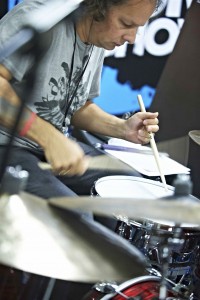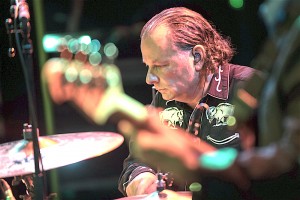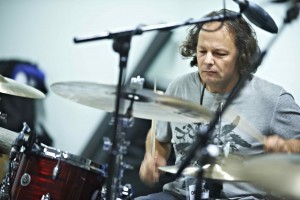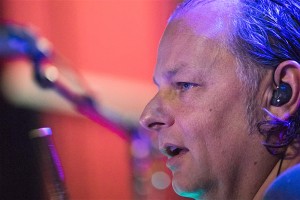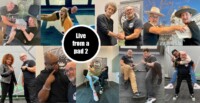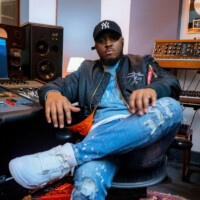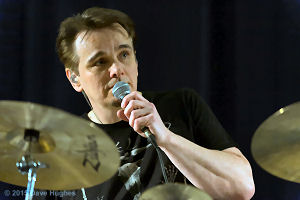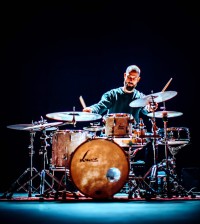Ralph Salmins is one of a kind. With names like Paul McCartney, Aretha Franklin, Elton John, Madonna, James Brown, Tom Jones, Mike Oldfield, Chaka Khan, Quincy Jones, Burt Bacharach, and Alison Krauss, to name a (small) fraction of his credits, Ralph not only has one of the most extensive but also most varied CVs out there.
And thats not to mention the 150+ movie soundtracks he has recorded for composers like Hans Zimmer, Danny Elfman, Alan Silvestri, John Williams and many more.
His extensive skillset, his experience in a vast amount of styles and musical situations, and last but not least, his positive and easy-going personality make him one of the most in demand session drummers in the world.
Besides all this he somehow still finds time to do clinics, he’s a composer and producer for his own production music company, runs a recording studio and is a Professor at the Royal College of Music and Guildhall School of Music & Drama.
I caught up with Ralph at the RCM Percussion day to chat about his first steps in the music industry, the different branches of his work and much, much more.
You started your professional drumming career very young.
Yes, I got my first pro gig when I was 16, which was a really lucky break. It was basically a function band, a working dance band, which was great to do. It gave me a lot of experience that I didn’t have. I did a lot of gigs with them and learned a lot.
Soon after college you went on tour with Kirk Whalum supporting Whitney Houston?
That’s right, it was an amazing experience. I did a little playing with Kirk and then he did a two week tour playing in Whitney’s band. They, quite last minute, asked him if he wanted to do the support slot for her European tour. They basically just couldn’t use all of Whitney’s band for the support slot too but they used some of them, so I was very lucky to play with Carlos Rios. He is the guy that played the guitar solo on ‘Brother to Brother’ and played on the first Chick Corea electric band album too. Killer player. We had Kirks bass player come over from the States with his keyboard player and I came from London. It was a fantastic experience. I’ve actually just recorded a track that I hope is going on Kirks new record, so it’s funny that all these years later we’re still connecting.
At college you actually studied classical percussion. How came the move to the drum set?
Well, I was always a drummer but I wanted to study and you couldn’t study drum set back then. There was a postgrad jazz course at Guildhall that started the same year as me, but I wasn’t postgrad, so I just went for classical. I loved it. It kept me a little back from when I wanted to practise drum stuff but overall it was really beneficial. I loved being at Guildhall and now I’m a teacher there which is amazing. I’m proud to have been there and proud to be involved in it now. The classical stood me in good stead I think.
Having a look at your credits on your website is simply mind-blowing. You’re certainly one of the most in-demand session players out there. What’s the key?
Uh, that’s a great question. I like a lot of different types of music and love to play in different styles. I think that just works for people who want to book a drummer and don’t really know what they’re gonna need. They might need a pop sensibility, they may need jazz, they may need someone who plays brushes, they certainly need someone who reads, someone who can follow conductors and who is used to playing in the studio with a click track. All of those are skills that I’ve got and that lends itself well to getting calls for different things. I think that is how it happened. What I say to everyone who wants to get into this kind of thing is to just get into loads of different styles and do it. That opens your world up to play in lots of different gigs. That’s all it is.
That would have been my next question. What makes a great session player?
All of those things. Versatility, genuinely being into all those types of music, working with people, wanting to work with a producer to make something that is good.
Also, getting on with people is important and genuinely wanting to make the music work.
I mean I’m not always happy about some of the things I’m having to play but even if the music isn’t to my taste, I treat it as a challenge and always genuinely try to do the very best for the music that I can. That to me is the bottom line.
Even if I don’t like the people I’m working with, which I usually do, I’m still gonna say to myself: hey, you’ve got to make that music happen.
You’ve played for so many artists that it’s hard to pick one out to talk about but you mentioned Van Morrison as an important one for your career?
Yes, it was one of those gigs where I had to really look into myself and find something extra for the music. Van is a very intelligent and sensitive artist and he wants a lot of depth. Working with him was a musical challenge but a beautiful one. For me I think in many ways it was the making of me in the sense that I learned so much from him. Although it was very tough at times, it was a great positive experience for me. He’s famous for that but it’s good for you. It was a fantastic period and I’m very fond of Van. He’s a genius and I’m very lucky to have been there for that time.
Has there ever been anything particularly challenging?
A lot of the Big Band stuff I’ve done has been quite challenging. Playing in Guy Barker’s jazz orchestra for example has been very challenging and musically extremely fulfilling. Playing in Colin Town’s Mask Orchestra and spending time with him – not only over here but also in Germany in the NDR Big Band with Colin – and, as a result then working with the NDR Big Band, all interesting, challenging projects. They’re a fusion of different musics. Sometimes it’s funk, sometimes Art House, Avant Garde, jazz and mixing all those together. It’s very interesting.
Most of it is more stylistic challenges as opposed to very difficult music. For example I’ve done one performance of the Turnage piece ‘Blood On The Floor’ which is extremely difficult. That was challenging in terms of music notes but I think styles are generally more challenging.
Your CV reaches from ABBA to Jessie J. How did you manage to stay so on top of it all over all these years and changes in the music industry?
That’s a really good question. Music is generational. I’m not setting myself out to be a hip hop drummer, or a Chris Daddy Dave, or anything like that. I can play good grooves, that’s what I do, and that applies to all music. Sometimes I play more modern music and sometimes I play quite old fashioned music but they’ve all got one thing in common: groove. When you do things for different people it’s just keeping it relevant to the music.
I don’t particularly try to stay relevant but I like certain types of music like and I love listening to Chris Dave and D’angelo for example. He is relevant in a contemporary soul music way and he’s doing things that are quite different. I’m influenced by him, I think of his playing when I hear stuff like that. I’m influenced by Benny (Greb) who’s here today, he’s an incredible drummer. All the guys who are out there at the moment influence me. Some of them are quite cutting edge and some of them are not. I’m interested in that so it keeps me involved in the music.
You do a lot of jazz and Big Band work. Where does that passion come from?
Yes, it’s one of my things for sure. I’ve done a lot of Big Band, it’s a lot of fun. I went to a kids rehearsal band when I was in my teens and we were playing Big Band music so I got introduced to that early – and the reading side of things, which was helpful. Not strenuous, just Glenn Miller and Count Basie charts. Nothing difficult but I got introduced to it and was playing it quite young at the age of 14.
Since then I’ve always been asked to play in Big Bands because I supposed people liked what I do and I enjoy doing it.
I do love jazz and playing in Big Bands but probably not all the time. It drives me mad sometimes! It’s also very nice to just play a simple groove, no hits, no charts, no nothing.
Let’s talk about the Waterboys. That’s your main gig at the moment?
Yes, that’s my regular gig. I’m in my seventh year with the band. This year we’ve got an album to release and then we’ll be playing festivals this summer like we do every year. We love that. Over summer we’re doing ten festivals around Europe and then have a small European tour in October/November which will be fantastic. I’m waiting to hear about the schedule for 2018 but apparently we’re going further afield. I hope we get a chance to go back to Australia, we’ve been there and loved it. We loved Japan and New Zealand, hope we can go back there. Also the States, so I hope we get to go to all those places.
You described it as a ‘grown up band’?
That’s exactly what it is. Well, it’s a grown up group of musicians.
Mike Scott is a formidable artist. He’s an amazing songwriter, an amazing singer, an amazing guitar player and he’s actually an amazing band leader. He runs a band fantastically. He’s extremely articulate about asking for what he wants and he’s easy to work with because he knows what he’s after as an artist.
It’s a lovely thing to do and I really enjoy it. It’s a challenge because when Mike goes on stage he is 110% every single time and he expects that from everyone. We try to step up to it, it’s not always easy but it’s a fantastic gig to do, I absolutely love it.
You have recorded over 150 movie soundtracks so far. How is the process different than say a pop recording?
Most of the movie soundtracks are written out so there is a lot of reading involved. That’s the main difference. Sometimes it is very loose and sometimes it’s very structured. I’ve got three sessions tomorrow with the London Symphony Orchestra for a film for Alexandre Desplat and I know he writes stuff out because he knows what he wants. There is always leeway in there though. I pretty much interpret the charts, there is no pressure and it’s just doing stuff that works. Most of it is written, especially the percussion things I do. Generally there is a big variation with movie soundtracks because people who compose them actually want a variety of things.
I remember you once told me about a session where you were scratching air vents at Abbey Road
Yes, that does happen. We did that for the soundtrack to Prometheus. Some of it is quite creative, other things are quite straight forward and some of it is very complicated. It’s a big variety and that’s what I like about doing them. It’s great working with fantastic composers, they’re very inspiring – Alexandre Desplat being one of my favourites, he’s an amazing musician.
Who writes the hardest parts?
Well, the last thing I had that was really hard was Alan Silvestri. A few years ago we recorded the score to the movie ‘The Croods’. There’s a little video on my website of us doing that. That was quite hard but you’re in the studio, if you get it wrong you just do it again. Sometimes you record with lots of people at the same time and if you’re the one who gets it wrong all the time, you could be in trouble. Generally it’s just a matter of making it work and hopefully everyones reading is good enough. I think I had the least good reading in the section out of everyone but I just about got away with it.
You do sometimes get the parts in advance but it’s just hard to find the time to look at them.
I’m guessing your classical percussion background helps a lot in those sessions?
It really has helped for sure. Mainly for the basic reading and being able to play lots of different things.
You call it “basic reading”.
[laughs] Well, most of it is fairly basic, you’d be surprised. A lot of the stuff we do is just crotchets and quavers, it’s quite simple. The key is it has to be really well placed and in time. That’s the difficult bit.
You do a lot of teaching as well. You teach privately, do clinics and you’re a professor here at the Royal College of Music.
Yes, it’s my 25th year at the RCM and I think I’ve been at Guildhall for about five years. Teaching is a big part of my life and I love doing it. I just got asked to do a masterclass here and basically never stopped. I learn a lot from my students and I think it’s a good way of understanding what you do. When you have to deliver it to somebody else you have to understand what’s going on. When I first started doing it I didn’t really have that sussed out. I have it much more sorted now, I know what’s going on and learned how to deliver it. I’m a much better teacher now than I was then.
It’s an important part of my life, I’m really inspired by it and want to carry on doing it.
Tell me about ‘Made Up Music’.
I started up this production music company about eight years ago and we do music for film and television. We’re up and running and have had some good syncs. I produce and compose for that and love it. It’s a great thing to get involved in. I’ve got a studio so I can do everything there. I get my mates in and we just write and record together. It’s really nice.
There is a lot of talking nowadays about there not being any studio work anymore and drums coming out of the box. You seem to be using this quite cleverly with things like Made Up Music, the Session band app you played on and playing on the Abbey Road drums plugins.
That’s a good point. I would say the session scene is not dead by any stretch of the imagination. It’s changed. People are making less records because there is no income stream, that’s just common sense. Artists go and play live gigs because there is more money in it.
With Made Up Music most of our stuff is live playing anyway, unless it’s hip hop or electronica, because that’s what we’re good at.
The Session band app, I just did those. They’re more for musicians and composers and they’re really good practise tools. I’m not gonna pay off my mortgage with it but they are nice things to be involved in.
The bottom line for me is still the same as it always was: playing drums, play music, working with people and doing music that I love to do. It was like that before, it was like that before and it will be like that in the future. And I think it will be like that for everyone because you can’t really change the nature of music. You can’t replace musicians with machines, it doesn’t work. There is no point in getting worried about it. We’re always gonna be around because people love to hear musicians play – thank goodness!
You’ve mentioned the ‘Bunker’, your studio, already. It’s a great studio which also shows your love for vintage gear.
I love vintage everything and I have some vintage gear in there, yes: drums, Fender Rhodes, a lot of vintage mics, some new mics…. I love the recording process and we do a lot of productions there, it’s a big deal for me. I find it very useful and always recommend students get involved in the recording process even at a very simple level. If you just have one mic and a little interface, that’s good. Just to get used to hearing yourself back is a very valuable asset.
I’m not trying to be an engineer but I was just always interested in it. I can record things but I’m not a mix engineer.
You have a new original project in the works too?
Yes, it’s called MLR: my friend Malcolm Edmonstone on keys and Lester, my son, on bass. We’ve got an album that we’ve nearly finished and today was the first day that we had this band play live. I hope to get the album finished as soon as possible and then get playing with these guys live. It’s a cross between groove, jazz and latin all thrown into one. Some of it is more funky, some is more jazzy. Not so much swing-jazz as such but it’s more inspired by maybe the music of Herbie Hancock when he’s playing groove music with solos. We’ve got horns on it, we’ve got some singers, it’s a big mix.
The album will probably be out next year. It’s been going for eight or nine years and it’s still not finished [laughs]. We’re excited about it though, it’s gonna be great when it comes out.
What’s next?
I’m in the studio next week recording that film. I don’t know what film it is but we’ll see when we get there.
Then the Waterboys festivals this summer which is gonna be great. We travel around a little bit for that: we’re playing in Norway, Spain, England, Scotland and Ireland.
Apart of that just more of the same: some sessions, continuing with my teaching and see what comes up.
Thanks a lot Ralph!
Interview by Tobias Miorin
May 2017

